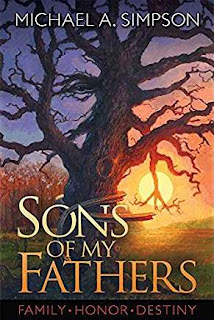Sons
of My Fathers by Michael
A. Simpson is based on the author’s own family history and reads almost like
a biography. However, I assume that attributes to its characters’ are as the
author imagines them and, hence, are fictional in detail; but what great
writing bringing this saga alive for the reader.
The cover of a denuded tree strangled by sabotaged
lengths of railroad tracks is haunting.
The book begins during 1864, the American Civil War.
Baylis Simpson and his family eke out a meager living as sharecroppers in
Georgia which, of course, backed the Confederacy. As in all wars, the
atrocities play out not only on the battlefield but split this fertile land and
its families asunder with obscene travesties against humankind. Baylis Simpson sees
his family destroyed. As he and his kin vow vengeance against the murderous
rabble taking property and lives that had escaped the Union Army, the Simpsons are
caught between the warring lines.
One hundred years later, Baylis’s descendent, young
Ron Simpson, becomes a U.S. Army helicopter pilot. He volunteers to serve his
country as a medevac pilot in Vietnam. His beliefs and his life are turned
upside down when, instead, he is assigned to fly a Huey gunship. He loves his
country deeply, but will not serve it by flying this killing machine. There is
only one option for him; by taking it, he threatens to destroy not just
himself, but his family.
The book’s chapters switch seamlessly from the physical
plight and mental turmoil of one generation to the other, and the reader
becomes deeply engrossed in the fate of both, while the book’s prose deftly adapts
to the tone and language of the times.
Without hammering it home, it left
me with a troubling message: We are not heeding history. Hence, we have learned
nothing!
I submitted Sons
of My Fathers to Helen Hollick's Discovered
Diamond Review site
where it indeed earned a sparkling and well-deserved place.
Get your Copy at Amazon.com
Sons-My-Fathers
Just chosen as Book Cover Design of the Month:
https://discoveringdiamonds.blogspot.com/
Just chosen as Book Cover Design of the Month:
https://discoveringdiamonds.blogspot.com/











